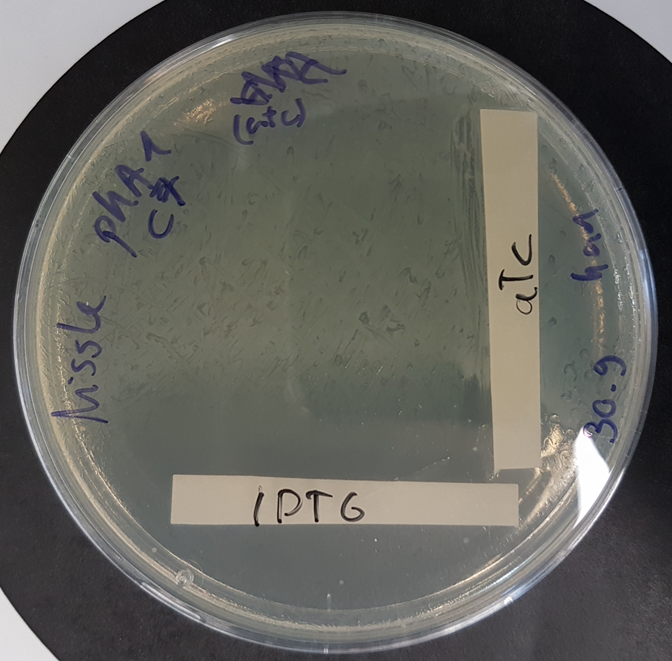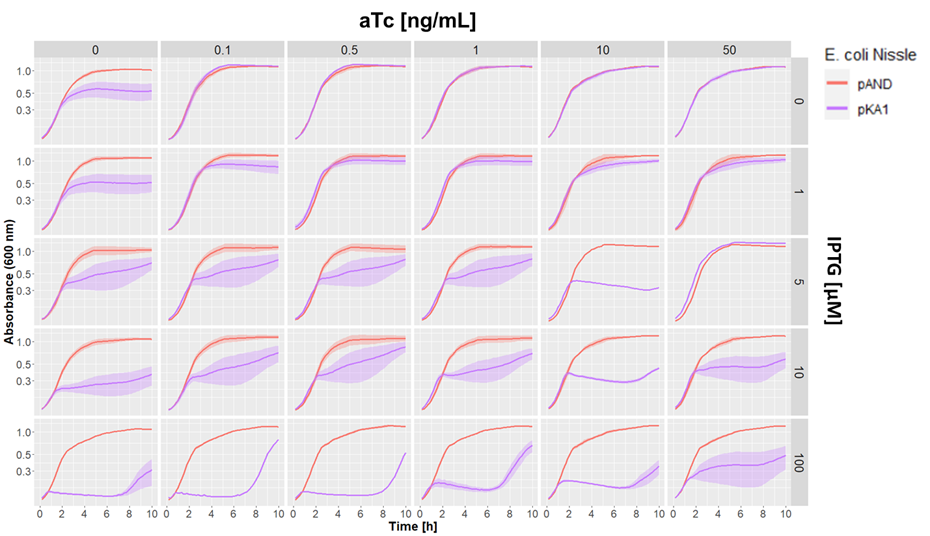Difference between revisions of "Part:BBa P1010"
(→Usage and Biology) |
|||
| (5 intermediate revisions by 3 users not shown) | |||
| Line 1: | Line 1: | ||
__NOTOC__ | __NOTOC__ | ||
<partinfo>BBa_P1010 short</partinfo> | <partinfo>BBa_P1010 short</partinfo> | ||
| + | |||
| + | {{Curation/ccdb}} | ||
{| | {| | ||
| Line 21: | Line 23: | ||
===Usage and Biology=== | ===Usage and Biology=== | ||
| − | For more information on how to use this brick, visit its [[Featured Parts:Cell Death]] | + | For more information on how to use this brick, visit its [[Featured Parts:Cell Death]] pa |
| + | |||
| + | ===Characterization from Igem Team UNILausanne 2020=== | ||
| + | Functional kill switch assay with IPTG and aTc gradients on agar plate | ||
| + | |||
| + | [[File:BBa K3482016 kill-switch plate.png|200px|]] | ||
| + | |||
| + | E.coli Nissle 1917 were transformed with a plasmid containing the part BBa K3482016 and the part <html><a style="padding: 0px; margin: 0px;" href="https://parts.igem.org/Part:BBa_K3482020"> BBa_K3482020 </a></html> (CcdA antitoxin part) and plated with a gradient of aTc and IPTG on agar plate. | ||
| + | The plate shows strong activity of the CcdA antitoxin with aTc induction, whereas IPTG induction promotes production of the CcdB toxin, resulting in a number of surviving cells (probable mutants) proportional to the dilution of the plated culture. | ||
| + | |||
| + | |||
| + | |||
| + | We aslo tested our pKA1 plasmid encoding for the ccdB toxin and ccdA antitoxin in <i>E. coli Nissle 1917 ΔclbA</i>. We used different concentrations of IPTG and aTc to study the effect of differential expression of the toxin and antitoxin on the growth of our strain. We compared this to the strain transformed with the empty vector pAND | ||
| + | |||
| + | [[File:BBa K3482004 atciptg.png|800px]] | ||
| + | |||
| + | Dose-response growth curve of <i>E. coli Nissle 1917 ΔclbA</i> harboring kill switch plasmid pKA1 at 37°C. <i>E. coli Nissle</i> with pAND (red line), <i>E. coli Nissle</i> with pKA1 (blue line). The lines and shade represent the mean ± standard error. | ||
| + | |||
| + | We observed desired growth inhibition of the strain with pKA1 at high IPTG and low aTc concentrations, while the pAND strain showed no alteration in growth in any of the tested conditions. The uniformity of these growth curves of the strain with pAND demonstrates that the standardized culturing and OD normalization of our protocol can yield highly reproducible results. | ||
| + | |||
| + | We saw an effect of IPTG on growth inhibition starting from 5 µM IPTG. At maximum IPTG concentration, we observed complete absence of growth of the pKA1 strain for the first 7 h. However, afterwards, we observed that the bacteria were able to grow. This was probably due to mutations in the kill switch system. In contrast, at lower IPTG concentrations (5 and 10 µM), we still observed an inhibitor effect on growth, which albeit being less strong, was more constant and persisted for at least 10 h. This suggests that decreasing the expression of the toxin lowers the selective pressure on the kill switch system, which makes this configuration more evolutionarily stable. In fact, while we observe a strong uninhibited growth of escape mutants after 7 h with 100 µM IPTG, at 10 µM IPTG the cells show a constant repression on their growth rate, which indicates that no or little escape mutants have emerged. | ||
| + | |||
| + | Overall, we demonstrated that the ccdB/ccdA encoding pKA1 plasmid could efficiently inhibit the growth of <i>E. coli Nissle 1917</i> at 100 µM IPTG for up to 7 h, and provided even longer growth inhibition at 5 and 10 µM IPTG. | ||
| + | |||
| + | ==References== | ||
| + | *Bernard P, Gabant P, Bahassi EM, Couturier M, Université Libre de Bruxelles. <i>Positive-selection vectors using the F plasmid </i>ccdB<i> killer gene.</i>" Gene 1994 Oct 11;148(1):71-4. pmid:7926841. [http://www.ncbi.nlm.nih.gov/pubmed/7926841 Pubmed] | ||
| + | *Bernard P, Gabant P, Université Libre de Bruxelles. <i>Cloning and/or sequencing vector</i> US Patent Number 5,910,438, 1999. [http://www.google.com/patents?vid=USPAT5910438 Google Patents] | ||
| + | *Bernard P, Gabant P, Université Libre de Bruxelles. <i>Cloning and/or sequencing vector</i> US Patent Number 6,180,407 B1, 2001. [http://www.google.com/patents?vid=USPAT6180407 Google Patents] | ||
| + | *Bernard P, Gabant P, Université Libre de Bruxelles. <i>Cloning and/or sequencing vector</i> US Patent Number 7,176,029 B2, 2007. [http://www.google.com/patents?vid=USPAT7176029 Google Patents] | ||
| + | * Bahassi, et al., Université Libre de Bruxelles. <i>Interactions of CcdB with DNA gyrase. Inactivation of Gyra, poisoning of the gyrase-DNA complex, and the antidote action of CcdA.</i>, J. Biol. Chem. 1999 274: 10936-10944. pmid:10196173. [http://www.ncbi.nlm.nih.gov/entrez/query.fcgi?cmd=Retrieve&db=pubmed&dopt=Abstract&list_uids=10196173&query_hl=2&itool=pubmed_ExternalLink Pubmed] | ||
| + | *[[Help:Plasmids]] | ||
| + | |||
<!-- | <!-- | ||
Latest revision as of 00:24, 28 October 2020
ccdB cell death gene
|
The CcdB protein, constitutively expressed by P1010, is lethal to most of the BioBrick cell strains, only DB3.1 is resistant. |
P1010 is used when putting BioBrick parts into BioBrick plasmids. The part to be inserted and the plasmid are cut with BioBrick enzymes and mixed. The mixture will include both the original uncut or religated plasmid and the desired structure. However, because of CcdB, all of the cells containing the original plasmid die and the surviving colonies are the desired result.
Also see P1016, a smaller part containing ccdB but not the inactive ccdA contained in P1010.
BioBrick Construction Plasmids Containing This Part
Most BioBrick plasmids are delivered with the P1010 insert
see P1010 Physical DNA for the current list of plasmids that are available in this form. This particular Biobrick with its Plasmid backbone is considered a
Construction Plasmid.
Usage and Biology
For more information on how to use this brick, visit its Featured Parts:Cell Death pa
Characterization from Igem Team UNILausanne 2020
Functional kill switch assay with IPTG and aTc gradients on agar plate
E.coli Nissle 1917 were transformed with a plasmid containing the part BBa K3482016 and the part BBa_K3482020 (CcdA antitoxin part) and plated with a gradient of aTc and IPTG on agar plate. The plate shows strong activity of the CcdA antitoxin with aTc induction, whereas IPTG induction promotes production of the CcdB toxin, resulting in a number of surviving cells (probable mutants) proportional to the dilution of the plated culture.
We aslo tested our pKA1 plasmid encoding for the ccdB toxin and ccdA antitoxin in E. coli Nissle 1917 ΔclbA. We used different concentrations of IPTG and aTc to study the effect of differential expression of the toxin and antitoxin on the growth of our strain. We compared this to the strain transformed with the empty vector pAND
Dose-response growth curve of E. coli Nissle 1917 ΔclbA harboring kill switch plasmid pKA1 at 37°C. E. coli Nissle with pAND (red line), E. coli Nissle with pKA1 (blue line). The lines and shade represent the mean ± standard error.
We observed desired growth inhibition of the strain with pKA1 at high IPTG and low aTc concentrations, while the pAND strain showed no alteration in growth in any of the tested conditions. The uniformity of these growth curves of the strain with pAND demonstrates that the standardized culturing and OD normalization of our protocol can yield highly reproducible results.
We saw an effect of IPTG on growth inhibition starting from 5 µM IPTG. At maximum IPTG concentration, we observed complete absence of growth of the pKA1 strain for the first 7 h. However, afterwards, we observed that the bacteria were able to grow. This was probably due to mutations in the kill switch system. In contrast, at lower IPTG concentrations (5 and 10 µM), we still observed an inhibitor effect on growth, which albeit being less strong, was more constant and persisted for at least 10 h. This suggests that decreasing the expression of the toxin lowers the selective pressure on the kill switch system, which makes this configuration more evolutionarily stable. In fact, while we observe a strong uninhibited growth of escape mutants after 7 h with 100 µM IPTG, at 10 µM IPTG the cells show a constant repression on their growth rate, which indicates that no or little escape mutants have emerged.
Overall, we demonstrated that the ccdB/ccdA encoding pKA1 plasmid could efficiently inhibit the growth of E. coli Nissle 1917 at 100 µM IPTG for up to 7 h, and provided even longer growth inhibition at 5 and 10 µM IPTG.
References
- Bernard P, Gabant P, Bahassi EM, Couturier M, Université Libre de Bruxelles. Positive-selection vectors using the F plasmid ccdB killer gene." Gene 1994 Oct 11;148(1):71-4. pmid:7926841. [http://www.ncbi.nlm.nih.gov/pubmed/7926841 Pubmed]
- Bernard P, Gabant P, Université Libre de Bruxelles. Cloning and/or sequencing vector US Patent Number 5,910,438, 1999. [http://www.google.com/patents?vid=USPAT5910438 Google Patents]
- Bernard P, Gabant P, Université Libre de Bruxelles. Cloning and/or sequencing vector US Patent Number 6,180,407 B1, 2001. [http://www.google.com/patents?vid=USPAT6180407 Google Patents]
- Bernard P, Gabant P, Université Libre de Bruxelles. Cloning and/or sequencing vector US Patent Number 7,176,029 B2, 2007. [http://www.google.com/patents?vid=USPAT7176029 Google Patents]
- Bahassi, et al., Université Libre de Bruxelles. Interactions of CcdB with DNA gyrase. Inactivation of Gyra, poisoning of the gyrase-DNA complex, and the antidote action of CcdA., J. Biol. Chem. 1999 274: 10936-10944. pmid:10196173. [http://www.ncbi.nlm.nih.gov/entrez/query.fcgi?cmd=Retrieve&db=pubmed&dopt=Abstract&list_uids=10196173&query_hl=2&itool=pubmed_ExternalLink Pubmed]
- Help:Plasmids



